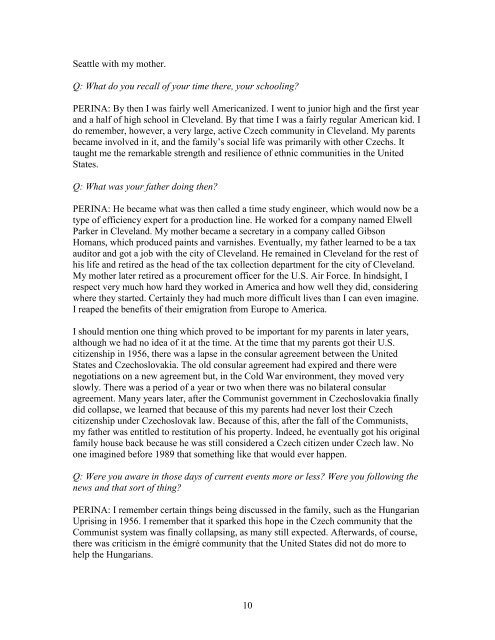ambassador rudolf v. perina - Association for Diplomatic Studies and ...
ambassador rudolf v. perina - Association for Diplomatic Studies and ...
ambassador rudolf v. perina - Association for Diplomatic Studies and ...
You also want an ePaper? Increase the reach of your titles
YUMPU automatically turns print PDFs into web optimized ePapers that Google loves.
Seattle with my mother.<br />
Q: What do you recall of your time there, your schooling?<br />
PERINA: By then I was fairly well Americanized. I went to junior high <strong>and</strong> the first year<br />
<strong>and</strong> a half of high school in Clevel<strong>and</strong>. By that time I was a fairly regular American kid. I<br />
do remember, however, a very large, active Czech community in Clevel<strong>and</strong>. My parents<br />
became involved in it, <strong>and</strong> the family’s social life was primarily with other Czechs. It<br />
taught me the remarkable strength <strong>and</strong> resilience of ethnic communities in the United<br />
States.<br />
Q: What was your father doing then?<br />
PERINA: He became what was then called a time study engineer, which would now be a<br />
type of efficiency expert <strong>for</strong> a production line. He worked <strong>for</strong> a company named Elwell<br />
Parker in Clevel<strong>and</strong>. My mother became a secretary in a company called Gibson<br />
Homans, which produced paints <strong>and</strong> varnishes. Eventually, my father learned to be a tax<br />
auditor <strong>and</strong> got a job with the city of Clevel<strong>and</strong>. He remained in Clevel<strong>and</strong> <strong>for</strong> the rest of<br />
his life <strong>and</strong> retired as the head of the tax collection department <strong>for</strong> the city of Clevel<strong>and</strong>.<br />
My mother later retired as a procurement officer <strong>for</strong> the U.S. Air Force. In hindsight, I<br />
respect very much how hard they worked in America <strong>and</strong> how well they did, considering<br />
where they started. Certainly they had much more difficult lives than I can even imagine.<br />
I reaped the benefits of their emigration from Europe to America.<br />
I should mention one thing which proved to be important <strong>for</strong> my parents in later years,<br />
although we had no idea of it at the time. At the time that my parents got their U.S.<br />
citizenship in 1956, there was a lapse in the consular agreement between the United<br />
States <strong>and</strong> Czechoslovakia. The old consular agreement had expired <strong>and</strong> there were<br />
negotiations on a new agreement but, in the Cold War environment, they moved very<br />
slowly. There was a period of a year or two when there was no bilateral consular<br />
agreement. Many years later, after the Communist government in Czechoslovakia finally<br />
did collapse, we learned that because of this my parents had never lost their Czech<br />
citizenship under Czechoslovak law. Because of this, after the fall of the Communists,<br />
my father was entitled to restitution of his property. Indeed, he eventually got his original<br />
family house back because he was still considered a Czech citizen under Czech law. No<br />
one imagined be<strong>for</strong>e 1989 that something like that would ever happen.<br />
Q: Were you aware in those days of current events more or less? Were you following the<br />
news <strong>and</strong> that sort of thing?<br />
PERINA: I remember certain things being discussed in the family, such as the Hungarian<br />
Uprising in 1956. I remember that it sparked this hope in the Czech community that the<br />
Communist system was finally collapsing, as many still expected. Afterwards, of course,<br />
there was criticism in the émigré community that the United States did not do more to<br />
help the Hungarians.<br />
10
















